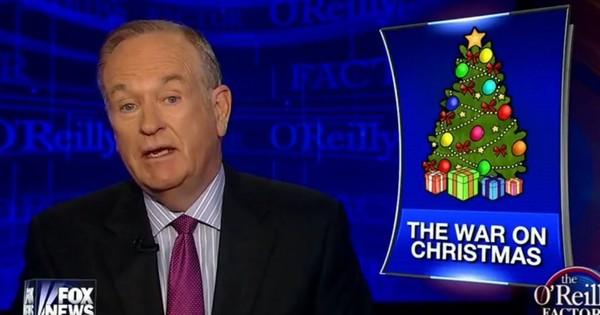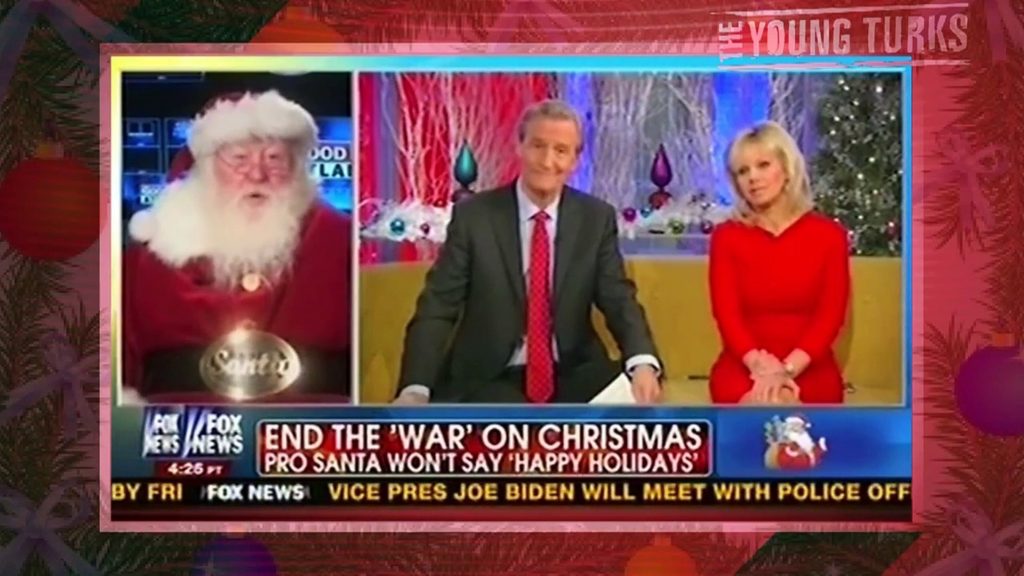
War on Christmas
The effort to find, fight, and win a “war on Christmas” illustrates how a charge can have a grain of truth while also being mischievously exaggerated to stir rage, mobilize votes, or boost ratings. There have indeed been absurd instances of cities or individuals who, in their hyper attentiveness to the sensitivities of nonbelievers, have purged innocuous Christmas symbols. For instance, a member of the Parent-Teacher Association at an elementary school in Frisco, Texas, advised parents not to have Christmas trees or use the colors green and white. (The suggestion was quickly overruled.)
But these slights have been cast as part of a “war” to prevent Christians from practicing their faith. In outlining the “Liberal Plot to Ban the Sacred Christian Holiday,” John Gibson of FOX News claimed that “it’s no longer permissible to wish anyone Merry Christmas.” Mysteriously, despite the demise of Christmas, 90 percent of Americans celebrate the holiday and 25 million Christmas trees manage to insinuate themselves into homes and town squares every year—including the ninety-four- foot-tall Christmas tree at Rockefeller Center, a few hundred yards from Gibson’s office. In addition to massively overhyping the threat, the war on Christmas folks misstate the motives of those who say “Happy Holidays” instead of “Merry Christmas.” Some retail stores have shifted greetings to avoid alienating potential customers, a pragmatic market-driven decision. December also includes Hanukkah, Kwanzaa, and, occasionally, Ramadan. For all that conservative Christians talk about the Judeo-Christian heritage, the insistence on “Merry Christmas” mostly serves to exclude Jews from the sentiment. Conservatives sometimes confuse pluralism (or plain courtesy) with secularism.
In fact, the rage expressed on FOX News is not shared by most people on either side of the debate. Polls show that of those who prefer “Merry Christmas,” only 19 percent are “offended” by those who say “Happy Holidays.” Of those who like “Happy Holidays,” only 11 percent are offended by “Merry Christmas.” Most view it for what it actually is: an attempt to be slightly more inclusive, a moderate solution to a minor problem. Merry Christmas? Sure, say most Jews and Muslims. Happy Holidays? That’s nice too, think most Christians. Most Americans are secret Madisonians. Of course, the small number of people who are offended get the airtime.
Concocting a fake “war on Christmas” has one notable advantage. It’s easy to declare victory. Within weeks of Donald Trump’s election, his former campaign manager Corey Lewandowski declared that thanks to Trump, “Christmas” was “not a pejorative word any more.” In December 2017, Trump himself declared victory and claimed that, thanks to him, “Christmas is back, bigger and better than ever before.” A pro-Trump political action committee ran an ad on Christmas day that ended with a little girl standing in front of a Christmas tree, declaring, “Thank you President Trump for letting us say Merry Christmas again!” Making Christmas Great Again may stoke some Trump voters but it does not convey the spirit of the holiday or, frankly, show religious people in an appealing light.

.